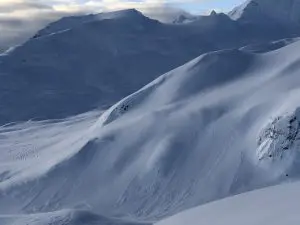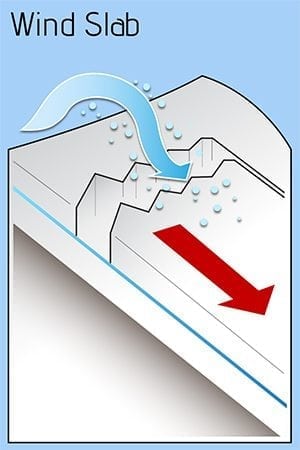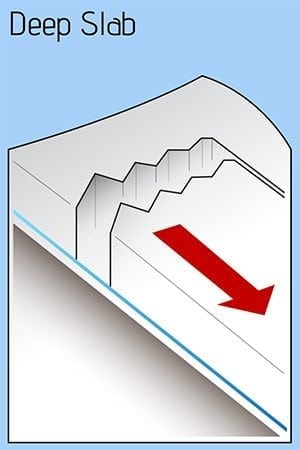Valdez
Above 4,000ftModerate
2,000 to 4,000ftLow
Below 2,000ftLow
Degrees of Avalanche Danger
Avalanche Problems
Problem 1
Stable conditions exist in most locations. Winds have been calm lately, except for wind channeled terrain, gaps and passes. Benign weather over the last week has allowed for our upper snowpack to settle and gain strength. New snow in the last 24 hours has been light and is not expected to significantly affect snowpack stability. If more snow arrives today than forecasted the hazard will be higher. There continues to be faceted snow at the base of our snowpack, although triggering an avalanche at this layer remains very unlikely.
The most likely place to encounter unstable snow would be on the lee side of high elevation ridge lines where sensitive wind slabs may exist in isolated locations. Watch for hard snow over soft and wind textured surfaces that would indicate winds have been redistributing surface snow. Avoid steep terrain where signs of instability exist such as shooting cracks or collapsing.
Thompson Pass received 3 inches overnight and is forecasted to receive an additional trace today. If the forecast is off and we end up receiving a significant amount of snow the hazard will be higher. Surface Hoar currently exists at or just below the surface that is widespread in many locations. The upper snowpack will become sensitive to human tiggers once a slab overlies surface hoar.
Likelihood:
- Almost Certain
- Very Likely
- Likely
- Possible
- Unlikely
Size:
- Historic
- Very Large
- Large
- Small
Trend
- Increasing
- Steady
- Decreasing
Problem 2
For the first time since 12-16 a natural avalanche was reported that failed at faceted snow near the base of our snowpack. This occurred 1/6 on a SW aspect ~3500′ between Catchers Mitt and Loveland Basin, crown 1-6 feet in depth. This is a repeat offender slope when loaded by wind, although is noteworthy due to its depth.
This avalanche has thus far been an outlier, however indicates that the strong wind affected snow that has capped the early season facets may be losing strength (faceting) making weak snow more easily affected by a person or Snowmachine at the surface in certain areas.
Recently our snowpack has been slowly building with light snowfall and calm to moderate winds. This weather will help our snowpack to heal in the longterm but in the short term will be putting incremental stress on weak layers at the base of our snowpack. This is a fine balance and is very difficult to assess as spatial (place to place) variability is currently significant. This recent avalanche is a perfect example that persistent weak layers are difficult to predict/assess and conditions may be different depending upon the area you choose to travel.
In most places at this point, triggering a deep hard slab avalanche is very unlikely, but the consequences would be significant. Keep this in mind when choosing terrain and strive to practice safe protocols. These include: good communication, skiing one at a time and avoiding terrain traps.

Likelihood:
- Almost Certain
- Very Likely
- Likely
- Possible
- Unlikely
Size:
- Historic
- Very Large
- Large
- Small
Trend
- Increasing
- Steady
- Decreasing
Avalanche Activity
Below is a summary of observed Avalanche activity from the last 7 days. Avalanches that were noted earlier in the season can be viewed by clicking the link below.
If you trigger or observe a natural avalanche consider leaving a public observation.
1/13- Numerous natural shallow (D1) soft slab avalanches were observed on all aspects and elevations. These were about 4 inches deep and look to have occurred during peak intensity of the 1/11 snowfall event.

Weather
Check out our updated weather tab! A collection of local weather stations are available for viewing with graphs and tabular data included.
NWS Watches and warnings
NONE
NWS Point forecast for Thompson Pass
Date Thursday 01/12/23 Friday 01/13/23 Time (LT) 06 12 18 00 06 12 18 00 06 Cloud Cover OV OV SC OV OV OV OV OV OV Cloud Cover (%) 70 70 35 75 85 90 85 95 90 Temperature 19 22 19 13 16 20 19 15 17 Max/Min Temp 23 13 22 14 Wind Dir E E NE NE NE E NE NE NE Wind (mph) 5 5 8 6 6 4 4 4 4 Wind Gust (mph) Precip Prob (%) 30 30 5 0 5 10 10 30 30 Precip Type S S S S 12 Hour QPF 0.04 0.00 0.00 0.02 12 Hour Snow 0.0 0.0 0.0 0.0 Snow Level (kft) 0.7 0.7 0.5 0.3 0.3 0.3 0.3 0.1 0.2
Click on link below for Thompson Pass weather history graph:

| Date:
01/15 |
24 hr snow | HN24W* | High temp | Low temp | 72 hour SWE* | January snowfall | Seasonal snowfall | Snowpack Depth |
| Valdez | 3 | .2 | 28 | 24 | .2 | 19 | 117 | 43 |
| Thompson pass | 4 | N/O | 24 | 0 | N/O | 50 | 244 | 39 |
| 46 mile | 0 | 0 | 2 | -3 | 0 | 24 | ~60** | 36 |
*HN24W- 24 hour Snow water equivalent in inches
*SWE– Snow water equivalent
**46 mile seasonal snowfall total begins December 1st.
Additional Information
Click on the link below for a running summary of the seasons weather history.
Announcements
The avalanche hazard is Moderate above 4000′ and low below. Recent calm winds and light snowfall have allowed the snowpack to settle and gain strength. Watch for freshly formed wind slabs in isolated locations that could be reactive to human triggers 1-2 feet in depth. If our area receives much more snow than the 1-2 inches forecasted the hazard will be higher.
Posted by Gareth Brown 01/15 8:00 am.
For a description of current avalanche problems, weather information, season history and more click the (+ full forecast) button. Avalanche forecasts will be issued Wednesday-Sunday.

